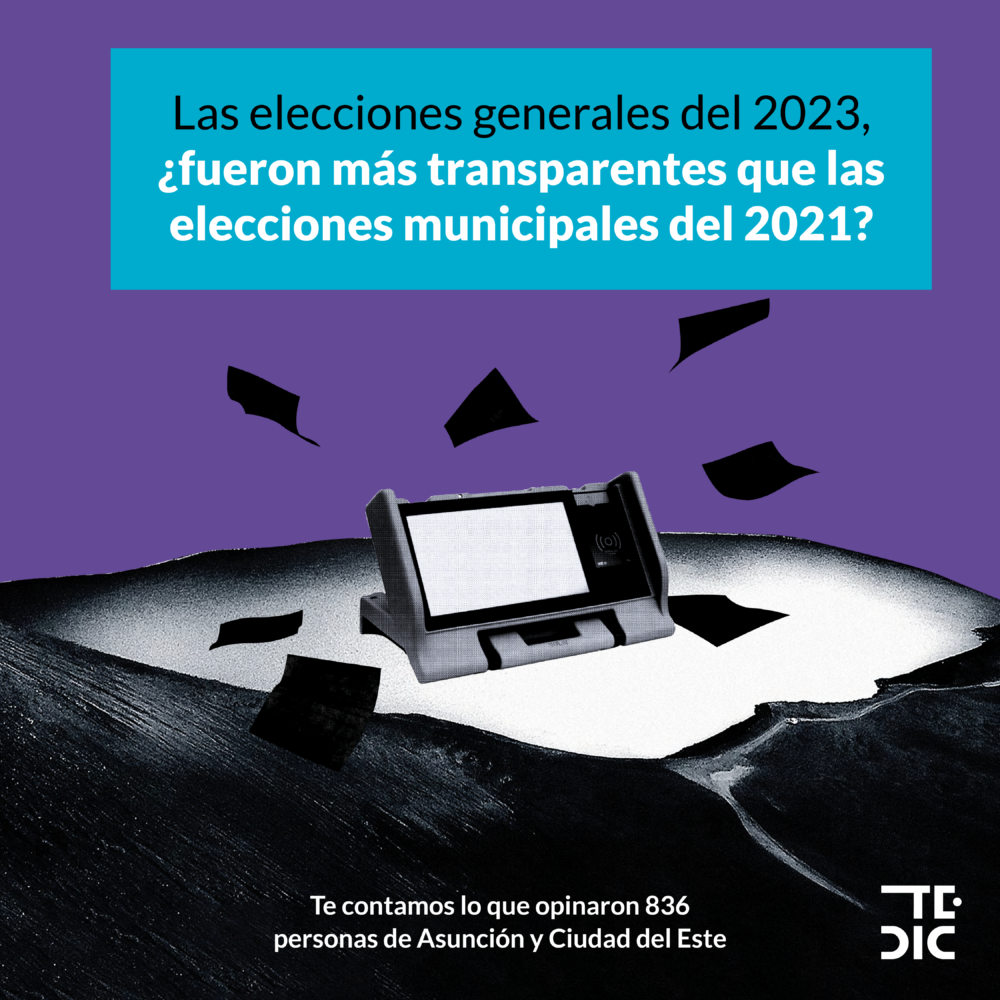
In an era where technology increasingly intertwines with our civic and human rights, electronic voting machines (EVMs) emerge as a promise to modernize electoral processes, bringing efficiency and speed. However, a closer analysis raises challenges in implementing this technology locally and globally.
At TEDIC, we have been conducting a series of research to understand how this implementation affects citizen participation, vote security, and trust in our electoral system. This latest report on “Use of Electronic Voting Machines in the 2023 Elections in Paraguay” sheds light on these aspects, based on a survey conducted during the general elections on April 30, 2023, in Asunción and Ciudad del Este.
The report collected 836 surveys across 30 polling stations. It builds on a similar initiative from 2021, allowing us to trace the progress and challenges that persist in electoral behaviour towards using electronic voting machines in Paraguay. It highlights the need to improve understanding of machine operation, ensure vote secrecy, and make electoral processes transparent. In these two years. Did we improve or regress?
Progress and challenges in the use of electronic voting machines
The data reveals significant advancements since 2021, notably in Asunción, where there has been a notable decrease in the number of voters entering the voting booth with accompaniment—a crucial move toward ensuring the complete confidentiality of the voting process. Nonetheless, in Ciudad del Este, the prevalence of this practice underscores an urgent need for targeted electoral education directed at the polling station officials of the Superior Court of Electoral Justice (TSJE). This effort is essential to preserve the integrity of assisted voting and prevent its misuse.
Another concerning finding is the ineffective management of vote control, with many voters omitting the double visual and RFID chip check. Such lack of control raises questions about the effectiveness of the communication and training before voting that electoral authorities must necessarily address.
This report not only diagnoses some persisting challenges but also seeks to propose solutions. Implementing independent audits is crucial to strengthening confidence in the electronic voting system. The participation of civil society, academia, and technical experts in this process is essential to ensure a robust and transparent electoral system in Paraguay.
Concrete recommendations
While we applaud the forward-looking initiative of César Rossel, the incoming president of the Superior Court of Electoral Justice (TSJE), to undertake a reform of the Electoral Code, we stress the importance of grounding this reform in solid evidence, leveraging our data and insights. Given the challenges we’ve identified, we strongly encourage the Superior Court of Electoral Justice to take decisive action, ensuring that these reforms are not just theoretical but are implemented in ways that tangibly enhance the integrity and transparency of the electoral process. Concretely, we recommend to:
- Develop clear policies directed at those responsible for electoral tables in all polling stations, emphasizing the criteria and conditions for assisted voting to prevent voters from entering the voting booth accompanied without a justified disability, as stipulated by current regulations.
- Train table members to remind and urge voters about the need for a visual and RFID chip check of the voting ballots.
- Launch effective communication campaigns to educate voters on electronic voting machines.
- Actively publish and promote data and work addressing these issues to increase transparency and understanding of the electronic voting system. Although we celebrate the progress, there is still a long way to go towards understanding and transparency of the electronic voting system in Paraguay. All involved parties must collaborate to mitigate these challenges and improve confidence in our electoral system. At TEDIC, we can contribute with data and experience and participate in the debate towards evidence-based electoral reform.
Download the report here.
